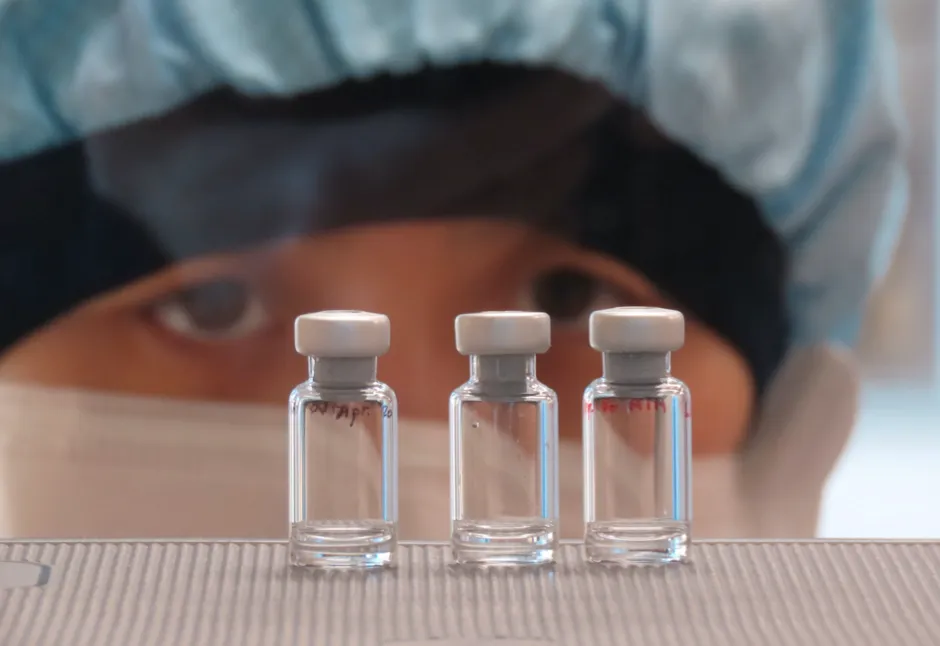Scientists hope to discover whether a potential coronavirus vaccine has worked by the end of August, pharmaceutical giant AstraZeneca has said, as it begins production ahead of the results being announced.
Pascal Soriot, chief executive of AstraZeneca, said the company had already started to manufacture the Oxford University COVID-19 vaccine to ensure, if it does pass human trials, it can be made available in the autumn.
The Jenner Institute and the Oxford Vaccine Group began the development of the vaccine candidate in January, and an initial phase of testing began on 160 healthy volunteers between 18 and 55. The vaccine, called AZD1222, has now progressed into late-stage Phase II/III clinical trials in more than 10,000 people from across the UK, including children and the elderly.
But Professor Adrian Hill, director of the Jenner Institute, said there were concerns that the low transmission rate of the virus in the community could leave the trial with only a 50 per cent chance of success.
Read more on the Oxford University COVID-19 vaccine:
- Oxford coronavirus trials: here's what we know so far about the COVID-19 vaccine
- Coronavirus vaccine: The race to create a cure for COVID-19
Trials of the potential vaccine have now started in Brazil, a new epicentre of the pandemic, to ensure the study can be properly tested as transmission rates fall in the UK.
Dr Soriot told BBC Radio 4’s Today programme: “We are starting to manufacture this vaccine right now and we have to have it ready to be used by the time we have the results [of the Oxford trials].
“And of course, with this decision comes a risk. But it is a financial risk and that financial risk is that if the vaccine doesn’t work, and we will find this out at the end of August, then all the materials, all the vaccines we have manufactured will be wasted.”
He said AstraZeneca would make no profit from the supply of the vaccine, adding: “We felt that there are times in life that corporations need to step up and contribute to resolving a big problem like this one, so decided to do it at no profit.”
300 million doses to be developed
Last month, Dr Soriot said AstraZeneca received an order from the British Government to supply 100 million doses of the vaccine, and that the company will start delivering these in September subject to successful human trials.
On Thursday 4 June, AstraZeneca signed a deal with the Coalition for Epidemic Preparedness Innovations (Cepi) and announced that together they would manufacture 300 million globally accessible doses of the coronavirus vaccine candidate that is currently being developed by the Jenner Institute at the University of Oxford.
If the vaccine is proven to be safe and effective, the first doses to be produced under this agreement are anticipated to be available in early 2021.
They will be released on a rolling basis as production is completed, and the full quota of 300 million doses is expected to be available by July next year.
Funding provided by the Coalition for Epidemic Preparedness Innovations
The funding of up to 383 million US Dollars (£234 million) from Cepi will aid the technical transfer of vaccine production technology to manufacturing sites mainly in Europe. This will create additional manufacturing capacity for the vaccine being developed by the Jenner Institute, and will also purchase manufacturing materials and reserve manufacturing slots.
Cepi is an alliance to finance and coordinate the development of new vaccines to prevent and contain infectious disease epidemics.
Dr Richard Hatchett, the chief executive officer of Cepi, said: “Cepi supported the early development of this vaccine candidate, contributing to the promising stage of development it has reached today.
“If it is proven to be safe and effective the vaccine could be amongst the first to be licensed, and Cepi’s partnership with AstraZeneca will make hundreds of millions of doses of the vaccine accessible to those at the highest risk."

“AstraZeneca and our other industry partners have a critical role to play in rapidly developing safe and effective vaccines and manufacturing the billions of doses needed to put a permanent end to the COVID-19 pandemic," said Dr Hatchett.
“AstraZeneca is admirably committed to equitable global access for this vaccine, and this partnership demonstrates how the COVID-19 Vaccine Global Access Facility will bring the private, public and third sectors together to make COVID-19 vaccines available to those who need them most, for the benefit of all.”
Meanwhile, UK-based vaccine manufacturer Seqirus announced it is working in partnership with parent company CSL, CEPI and the University of Queensland to help develop a candidate COVID-19 vaccine in Australia.
Its manufacturing base in Liverpool is producing an adjuvant, an agent which improves the immune response of a vaccine.
What is the Oxford vaccine candidate made of?
The vaccine candidate AZD1222 is made from a weakened version of a common cold virus (adenovirus) that causes infections in chimpanzees.
The adenovirus has been genetically changed so it is impossible for it to grow in humans.
Coronaviruses, such as the one that causes COVID-19, have an outer coat of protein spikes– recognisable in images of the virus. These spikes are what attach to the proteins on human respiratory cells, enabling the virus to enter and infect them.
The researchers vaccine candidate contains the genetic code of the protein spikes found on the coronavirus. They hope this will make the body recognise and develop an immune response to the spike protein that will help stop COVID-19 from entering human cells and therefore prevent infection.
Read more:
